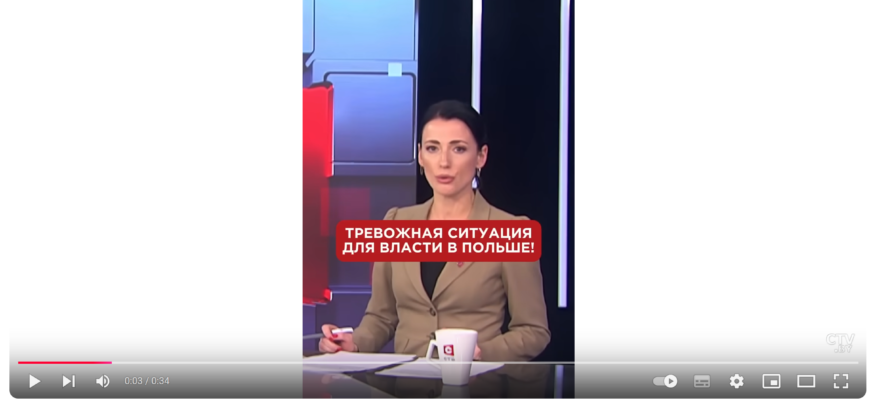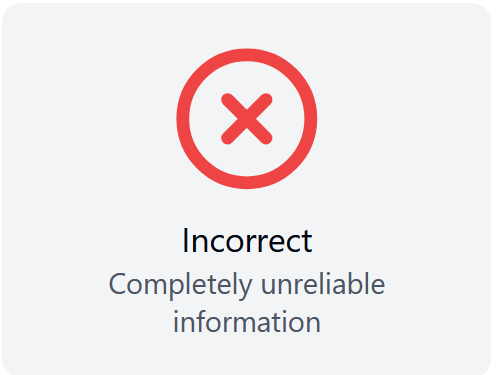On October 28, a short video with a clickbait title “Polish authorities are losing people’s trust! #Poland #politics #news #Duda #Tusk #government #shorts” was posted on the YouTube channel CTVBY. This video gathered over 620,000 views in four weeks, containing the following statements:
A worrying situation is developing for the Polish government. It is losing the support of the population. This is according to a survey conducted by the National Sociological Institute. It turned out that more than half of the residents have stopped trusting Prime Minister Donald Tusk. In just one month, the number of his opponents increased by almost 6%. The rapid decline in popularity of the head of the Cabinet is explained by the dissatisfaction of the Polish people, rising cost of living, and a host of other accumulated problems. However, the Polish president is not far behind Tusk.
FactCheck.BY decided to verify this information.
Verdict: Incorrect. Completely unreliable information
- There is no such organization as the National Sociological Institute in Poland.
- Actual data from the October CBOS survey: More than a third of respondents express satisfaction with Donald Tusk being head of government (36%, down by 2 points). As in the previous month (September 2024), half of the adult Poles are dissatisfied with Donald Tusk as prime minister (50%, unchanged). The percentage of people who do not have a clear opinion on this matter increased (by 2 percentage points, to 14%).
A detailed article about the October survey conducted by the Fundacja Centrum Badania Opinii Społecznej (CBOS) was published on October 25, 2024, by the largest Polish news agency Polska Agencja Prasowa (PAP). Chart from the official CBOS press release: Are you satisfied with Donald Tusk being head of government? 
The article on the PAP website also states that 34% of respondents support the government (down by 1 percentage point compared to the previous survey), 39% consider themselves opponents (up by 1 percentage point); 24% express indifference (up by 1 percentage point), and 3% have no opinion (down by 1 percentage point). Our comment is that nearly one in four (24%) are indifferent to this situation.
Women rate the government’s achievements slightly better (39% positive opinions) than men (35%), which is especially evident in the level of criticism (50% negative opinions among men and 45% among women).
According to CBOS, among supporters of individual political groups, the current government’s achievements are most positively perceived by voters of the Civic Coalition (91%). Supporters of other parties in the government coalition also rate them positively—voters of the “Third Way” (61%) have a much better opinion than left-wing voters (48%). In recent months, the percentage of critical voices towards Donald Tusk’s government achievements among the left-wing electorate has increased significantly (23% in August, 32% in September, and 43% in October).
The study was conducted using a mixed procedure on a representative sample of adult residents of Poland taken from the PESEL register. The survey was conducted on October 3-13 on a sample of 1025 people (of which: 59.9% by CAPI, 24.7% by CATI, and 15.4% by CAWI). (PAP)
The text of this YouTube video from the CTVBY channel was also analyzed for potential disinformation narratives:
- Generalization and lack of context: The statement that “more than half of the residents have stopped trusting Prime Minister Donald Tusk” can be misleading if no specific figures or survey context is provided. Without indicating how many people participated in the survey and what the previous trust levels were, this statement can create a distorted view of the situation.
- Cause and effect: The phrase “The rapid decline in popularity of the head of the Cabinet is explained by the dissatisfaction of the Polish people, rising cost of living, and a host of other accumulated problems” implies that the decline in popularity is directly related to the stated reasons. However, this may be an oversimplification of a complex political situation, where trust levels can be influenced by multiple factors, including media coverage, political events, and external circumstances.
- Emotional tone: The use of phrases like “a worrying situation” and “rapid decline in popularity” creates an emotional load that may influence the reader’s perception. This can lead to heightened negative perceptions of the government, even if the actual data is not so clear-cut.
- Vague terms: The term “a host of other accumulated problems” is vague and does not provide specific information on what problems are being referred to. This can lead to various interpretations and reinforce disinformation, as the reader may fill in the gaps with their assumptions.
- Comparison with the president: The statement “the Polish president is not far behind Tusk” can be interpreted as an attempt to create an association between the decline in popularity of the prime minister and the president, which can be misleading if no specific data on the president’s popularity or political actions is provided.
Overall, the video’s text contains elements that can be interpreted as disinformation due to their generality, emotional tone, and lack of specific context.










